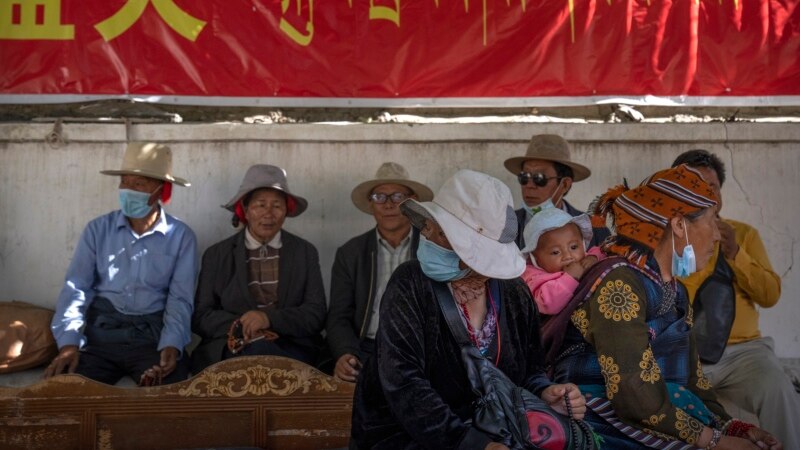
Taipei, Taiwan — In a newly released report, Human Rights Watch says China has been accelerating the forced relocation of Tibetan villagers and herders in the name of “poverty alleviation” and environmental protection since 2016.
While Chinese authorities describe the relocations as voluntary, the New York-based international rights organization’s report cites more than 1,000 Chinese state media reports and government publications that it says contradict that assertion.
“The news articles indicate that participation in whole-village relocation programs in Tibet is in effect compulsory,” the report said, adding that many Tibetans asked to relocate express “high levels of reluctance.”
China’s official data suggests that more than 930,000 Tibetans in rural areas have been relocated since 2000, and around 76% of these relocations happened since 2016, the report said.
Of that total, at least 140,000 rural Tibetans were moved as part of what authorities called “whole-village relocation.” In some cases, rural Tibetans are relocated to places hundreds of kilometers from their homes.
And while some Tibetan villagers are reluctant to take part in the government’s relocation program initially, state media reports show how local authorities have used coercive measures, including repeated home visits, threats of punishment or the banning of criticism, to push these Tibetans to comply, the report said.
“In some cases, officials of increasing seniority visit families to gain their ‘consent’ [while] some official reports show [local authorities] telling residents that essential services would be cut to their current homes if they didn’t move,” the report wrote.
Human Rights Watch also found that higher-level authorities would routinely pressure local officials to use coercive measures to achieve the goal of relocating rural Tibetans. The higher-level authorities would “routinely characterize the relocation program as a non-negotiable policy coming straight from the national capital, Beijing, or from Lhasa, the regional capital,” the report said.
Maya Wang, the interim director at Human Rights Watch, told VOA that the forced relocations are part of the Chinese government’s efforts to “assimilate” Tibetans into the majority Han Chinese society.
“The whole project has an impact of transforming Tibetans’ way of life,” Wang said, adding that the relocations “undermine the Tibetan language, culture and religion.”
During a press conference in 2020, China’s State Council Information Office said 266,000 rural Tibetans had been relocated to 965 areas established by the Chinese government as part of its efforts to “alleviate poverty” in Tibet.
Misleading promises
In addition to the “whole-village relocation,” the report said around 567,000 rural Tibetans may have been relocated as part of the government’s “individual household relocation” program since 2016.
While individual household relocation involves less coercive measures, Human Rights Watch found that officials would try to gain Tibetan families’ consent by providing misleading information about the economic benefits of moving to a new place.
“Surveys carried out by official scholars at relocation sites in Tibet concluded that many of those relocated ‘cannot find suitable jobs to support their families’ and ‘satisfaction with relocation is low,’” the report said.
These Tibetans “have to leave their animals and move to an area near a town where they can’t farm,” Robert Barnett, an expert on Tibet at King's College London, told VOA by phone.
He said in other cases, rural Tibetans are relocated to areas they are not familiar with culturally, and one of the requirements for them to find jobs in urban centers is to acquire Chinese language skills. “There are lots of question marks about whether the Chinese government thought through this strategy,” Barnett said.
To help Tibetans find jobs, Barnett said the Chinese government has tried to set up industries and projects for them to work on. “I’m not sure it’s a very satisfying form of income for the Tibetans, as they’ve spent their entire lives being their own bosses,” he told VOA.
In response to the report, the Chinese embassy in the United States said the assertion that Tibetans have been forcefully relocated is “entirely groundless.”
“No one has been forced to become ‘transferred laborers’ in Xizang [China’s official name for Tibet] and workers of all ethnic groups in Xizang choose their professions according to their own will,” Liu Pengyu, the spokesperson of the Chinese embassy in the U.S., told VOA in a written response.
Violation of international law
Despite the Chinese government’s defense of its relocation program in Tibet, Human Rights Watch said the two relocation programs and other government programs that require rural Tibetans to rebuild houses or adopt “a sedentary way of life” if they are nomads have affected most of the 4.55 million Tibetan population in rural areas.
“While such mass relocations of residents have been occurring elsewhere in poor rural areas in China, these drives risk causing a devastating impact on Tibetan communities,” the report wrote.
Maya Wang told VOA that the involuntary nature of these relocations constitutes forced eviction, which is prohibited by international law. “This is a classic Chinese development behavior towards minorities that in many ways violates international human rights law,” she said.
Some Tibetan activists worry that the mass relocation or displacement of Tibetan communities may eventually “eradicate the Tibetan identity.”
“It takes many years for [a community] to flourish in one land, and you can’t easily build that in a place where you are not willing to go,” Tenzin Choekyi, a senior researcher at Tibet Watch, told VOA by phone.
In her view, the implementation of the relocation policies hasn’t taken the Tibetan community’s opinions and thoughts into consideration. “The Tibetan identity is in the hands of the Chinese party-state and is being eradicated under different policy directives,” she said.